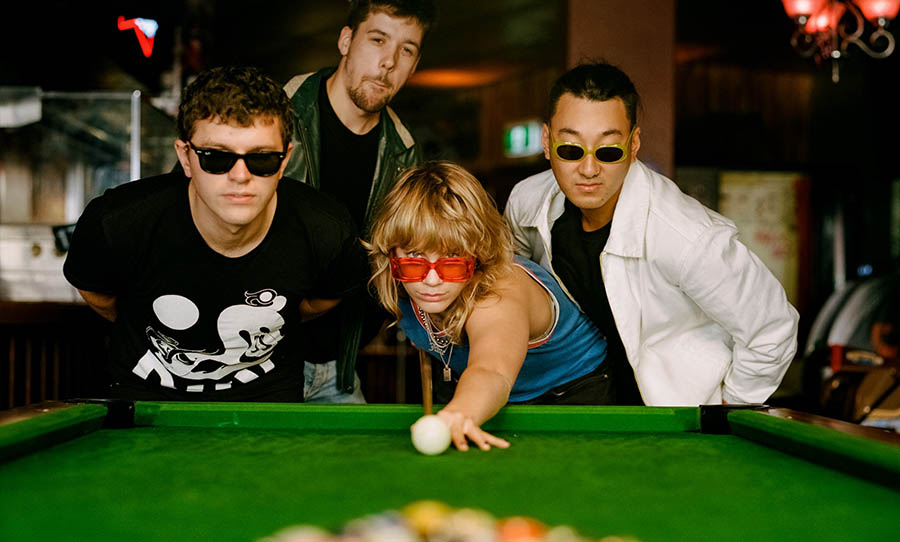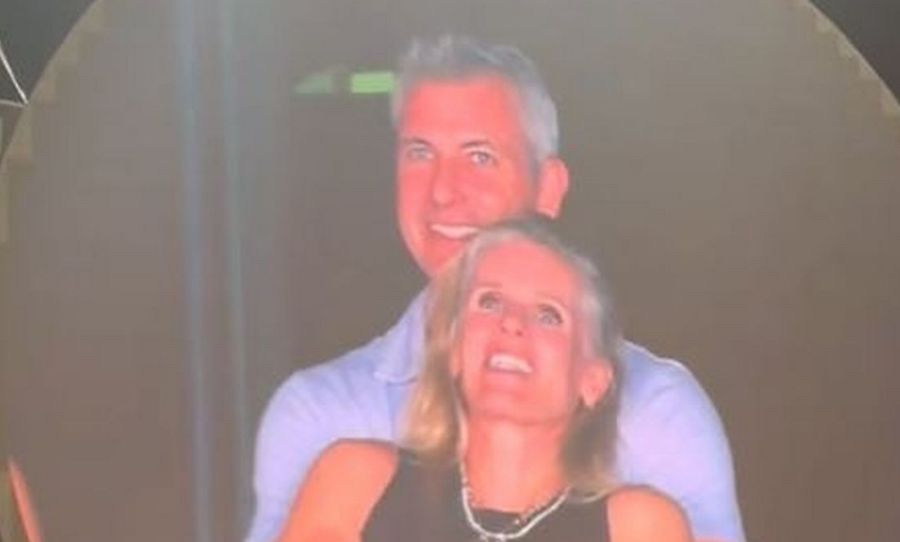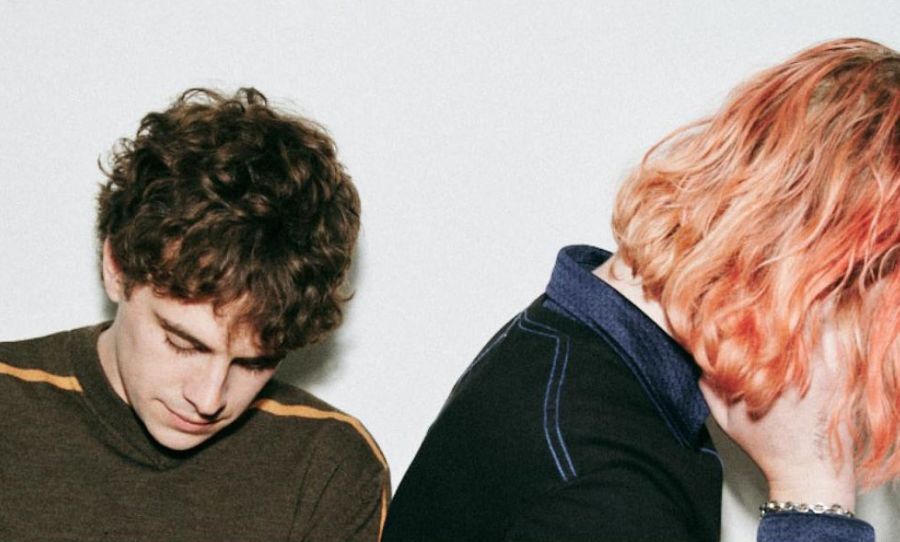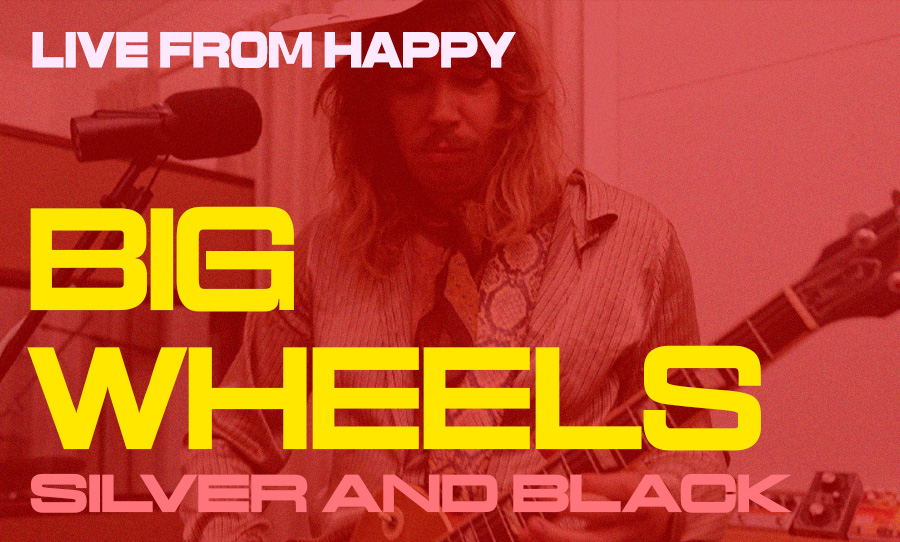Miss June’s live performance is an explosion. Whenever the band take to a stage, they leave shards of musical shrapnel flying across the room. With this consistently hard-hitting live show, they’ve quickly built a reputation as an act to watch.
Shortly before they released their debut full-length album Bad Luck Party, we caught up with all four members—Annabel Liddell, Tom Leggett, Jun Park, and Chris Marshall—to chat about their explosive approach to music, balancing DIY ethics with major label attention, and fighting your way out of a creative rut.
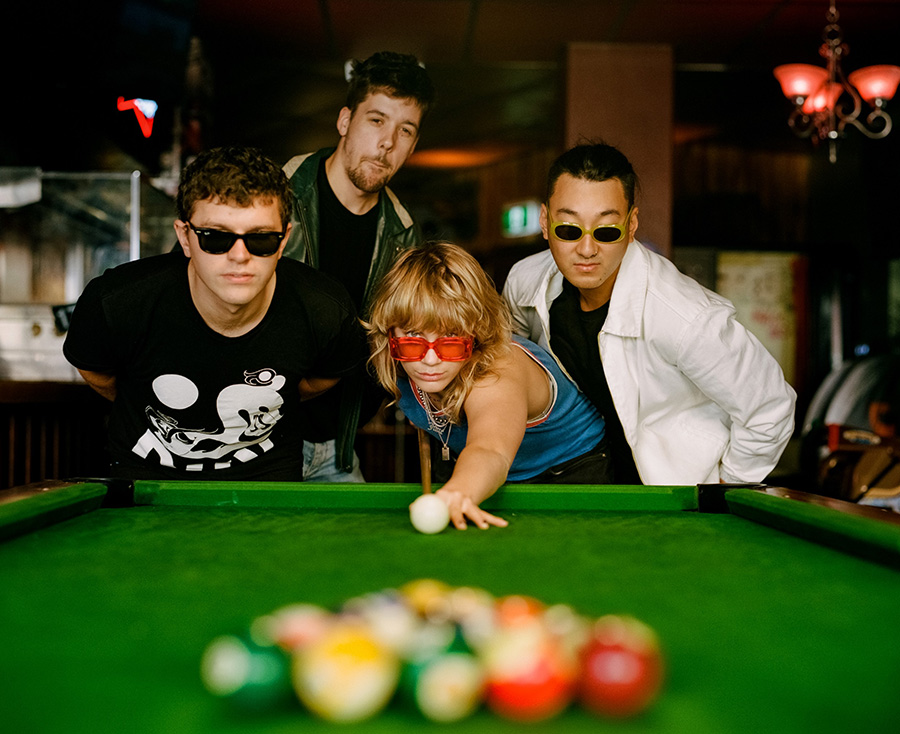
“We were never going to be the kind of band that dressed a certain way or looked a certain way. We were never going to be a band that’s easy to categorise“.
HAPPY: Congrats on getting the album done! The way I’ve heard people talk about albums in the past is that when they’re writing and recording it, it belongs to them… but as soon as they release it, it no longer does. Have you found this to be true in the past?
ANNABEL: It’s not so much the music not being ours, but I think it’s more having so many people on our team all of a sudden. We just signed a record deal with French Kiss, and they’re a subsidiary of Sony, so it’s major label stuff. Moreso than the music, we’ve had to let go of all the organisation of stuff. It’s funny, coming from being such a DIY band, where we’ve done that ourselves for so many years. But yeah, maybe ask us again after it’s been released and we might have a different opinion.
TOM: Yeah, and we’ve been working on it for so long. So, for me at least, it’s going to be a huge relief. I can’t wait for it to be released.
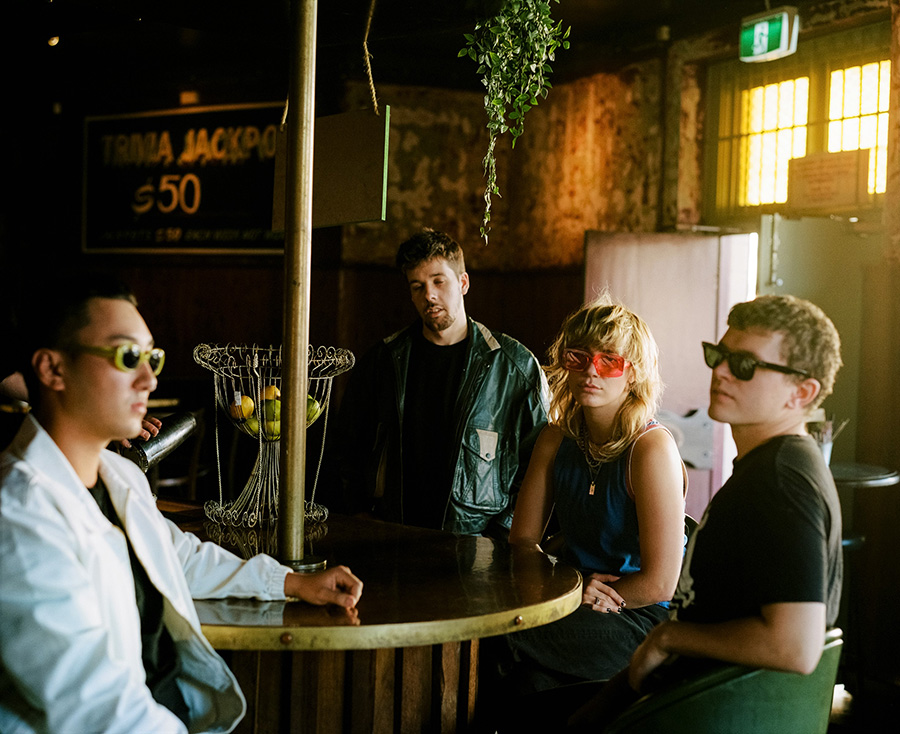
HAPPY: What’s the transition been like, going from a real DIY approach to having everything handled by a team?
ANNABEL: It’s been a mixed bag. I felt really burnt out at the end of last year, so having a management team has been a real godsend. But at the same time, these little things creep through… there might a support band that we wouldn’t have necessarily booked, or something we wouldn’t have normally pitched for. But then there was the Ruby Fields tour, for example, which isn’t something that I’d have normally pitched for—our management pitched that—and that ended up being the funnest tour ever. So it’s been really positive.
TOM: It’s funny as well, because when you get a management team you think “we can sit back and let them do the work,” but it’s actually the exact opposite. When you get a management team, you’ve really got to step up.
ANNABEL: It’s so true. You’ve got to work so much harder.
JUN: They’re doing more, so we’ve got more work. It’s good.
HAPPY: I suppose you’d have to put a fair amount of trust in other people for that kind of setup to work…
ANNABEL: Yeah, exactly.
HAPPY: Was that ever difficutl?
ANNABEL: Well, we still don’t really trust anyone but ourselves. But I think the more we’ve worked with our management, and the more we’ve realised that they have our best interests at heart, the better it’s gotten. Plus, these are still very early days.
HAPPY: Back on the theme of ‘letting go’, do you feel like you’ve built a stronger attachment to the full-length album than you have to past singles and EPs?
ANNABEL: In the sense of time spent on it, we’ve been far more pedantic with the full-length album. We’ve spent two years on this thing. Three even. The EP was done in less than a week.
CHRIS: Two days.
ANNABEL: Yeah, two days. That was all done in two days. That was very personal though, because it was the first thing we put out. This is far more personal, however, because we’ve put so much more into it. The songwriting on it is far more even split.
HAPPY: So the new album has been more collaborative than past releases?
ANNABEL: Yep, far more collaborative. It’s been really great.
HAPPY: Was there a conscious effort to take a more collaborative approach?
ANNABEL: Yep, definitely.
JUN: It’s also a matter of becoming more comfortable with each other.
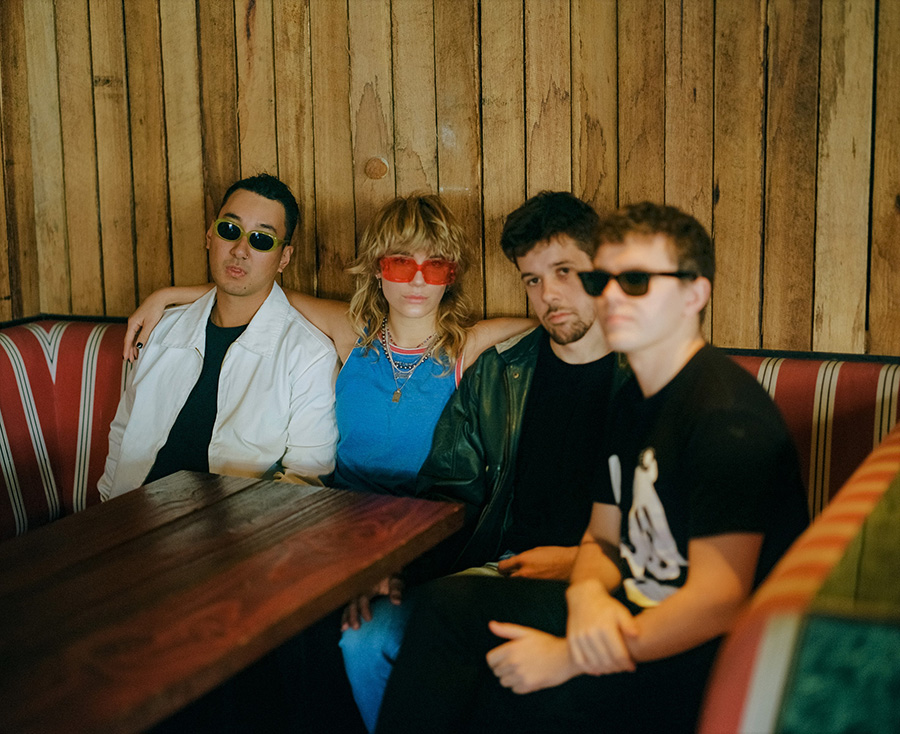
HAPPY: Does one person generally bring an idea to the rest of the band, or do you develop concepts together?
CHRIS: It’s generally as a group. One person will bring in a small idea, like Annabel will have a guitar part, or Jun will have a riff, then we’ll workshop it together.
ANNABEL: There are still rare occurrences where I will write a song from start to finish and bring it to the band, but they still change so much by the time they get recorded.
HAPPY: I’m interested in the timeline of this album… because I remember reading that after the EP, you found yourself stuck in a creative rut. Was there a specific moment when you broke out of this?
ANNABEL: Yeah, we definitely went through a bit of a creative rut for about a year or two. Then we built into the process we just talked about… the process of being more collaborative. Plus, Tom lived in China for a few years and got quite busy with his other band, I was busy at uni, and Chris and Jun were both bust with their own songwriting.
JUN: And we were still such kids when we wrote that EP. We were 19. Fresh out of high school.
ANNABEL: We didn’t even know each other, it was crazy.
JUN: I still feel like we are kids, but we’ve got a bit more to say.

HAPPY: How did you guys come together then? If you didn’t know each other when you recorded your first EP…
JUN: Annabel just saw me around then begged me to play. She got down on her knees and begged.
ANNABEL: Nah, these guys were all studying jazz, so they’ve all got jazz degrees. I had been playing in another band called Girlfriends, then I got ditched by all the other members, and had all these gigs that I needed to play. Literally, these were the first three people I met to try and write this music with. I kind of knew Chris from before, then he brought in the best drummer in his class, which was Tom, then we eventually let Jun in.
JUN: Eventually let me in?
ANNABEL: You know that’s the truth Jun. I remember you brooding in the corner, and I said “you can play if you want,” then you immediately said “okay.”
JUN: From my memory of what happened, you were struggling with something, then said “hey, you’re a guitarist, can you do this thing for me?” Then I wrote a solo and you begged me to stay. You begged.
HAPPY: Did that creative rut that occurred after your first EP force you to approach things differently?
ANNABEL: Yeah, definitely. I think you sometimes need to go through a time of not writing to be able to write. What do you guys think?
JUN: I think we all went through our own journeys. We all graduated from jazz school, and I struggled hard after that. It’s stressful man, figuring out who you want to be as a musician.
CHRIS: We all learnt a lot about ourselves.
ANNABEL: I don’t even think we were conscious of what were saying. Those songs came from a teenage me, who was so angry. People looked so far into that, and I did interview after interview after interview about feminism. I didn’t even realise the gravity of calling an EP ‘Matriarchy’. We called it that because it was the best song on the EP. It wasn’t a political statement or anything. After that, it really threw into perspective that people are paying attention to my lyrics, and people do want that deeper meaning. Which is heavy, but it’s helped me frame songs, in terms of what I actually want to say.
HAPPY: Do you identify any specific changes you’ve made to songwriting since making that realisation?
ANNABEL: Yeah, although the songs are still balls-to-the-wall feminist, they have a lot of the whole band’s lyrics on there, as well as just mine. Which has made it a lot more diverse. But there are also a lot more personal songs on there. They’re fuelled by my own heartbreak and loss, and things like that.
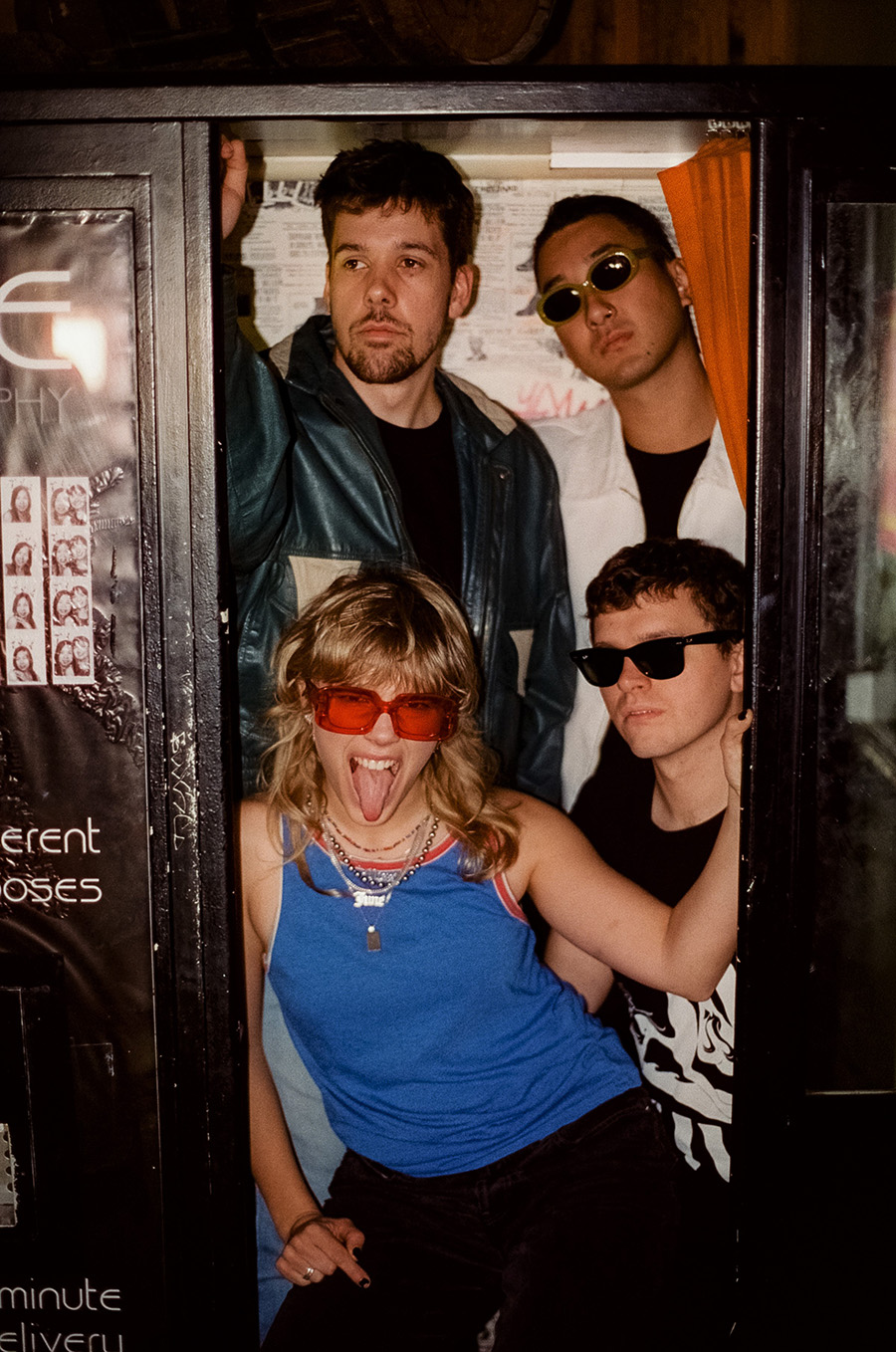
HAPPY: Did that diversification of lyrical content come about pretty naturally?
JUN: Yeah, it just kind of happened. Lyrics just come to you, as cheesy as that sounds. You don’t necessarily choose to make a song about a certain thing, it just kind of comes out.
ANNABEL: There is a real distinction that I made. Some bands choose to look and sound a very specific way, for example, some people say “I wanna look and sound like The Strokes,” and there are heaps of bands who do that really successfully. But the process of realising that everyone in this band is so different really helped make it more personal. We were never going to be the kind of band that dressed a certain way or looked a certain way. We were never going to be a band that’s easy to categorise. All I can do is be authentic to myself. But also, I’m not the kind of person who sits and broods over lyrics for days and days. I normally go with the first thing I write and stay on that track.
HAPPY: So there’s no concrete vision of Miss June should be?
JUN: No, but that’s the best part. We just want to make the best music we can.
Listen to Miss June’s debut album Bad Luck Party above, and catch the band live at any of the following dates:
September 11th – The Vanguard, Sydney
September 12th – Oh Jean! Records, Melbourne
Plus supporting Dune Rats at the following dates:
September 12th – The Croxton, Melbourne
September 13th – The Metro, Sydney
September 14th – The Triffid, Brisbane
More info here.
